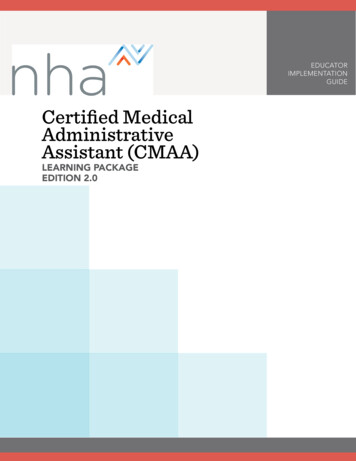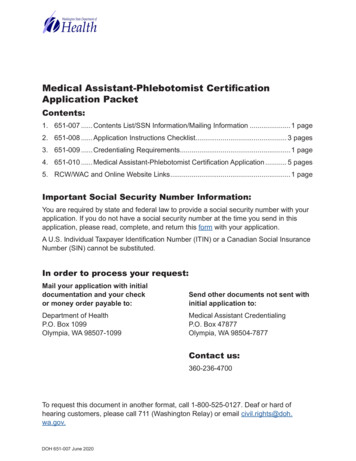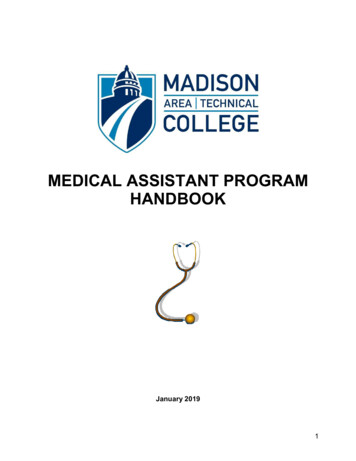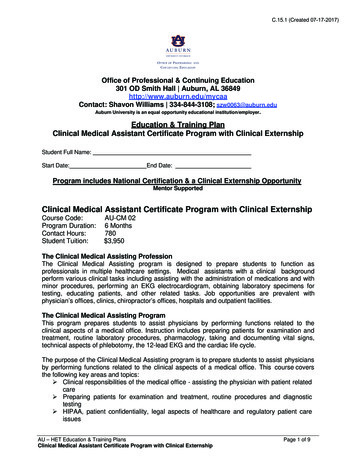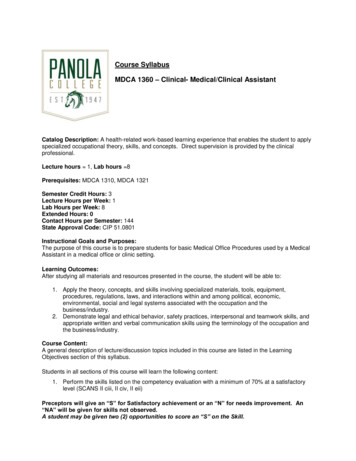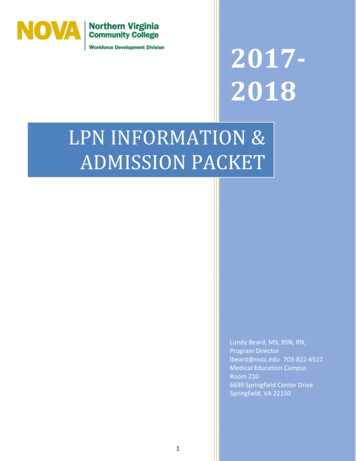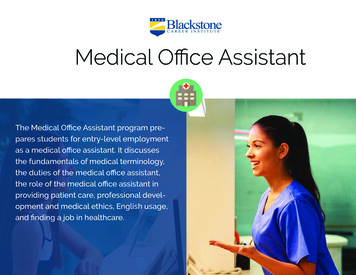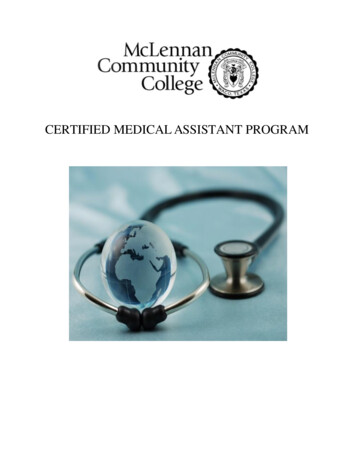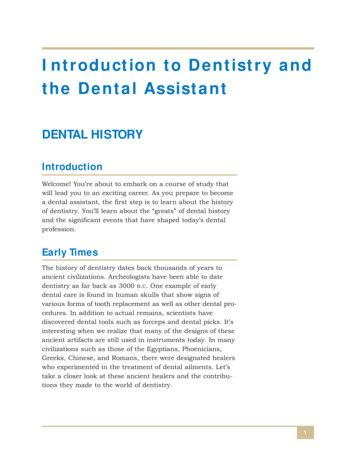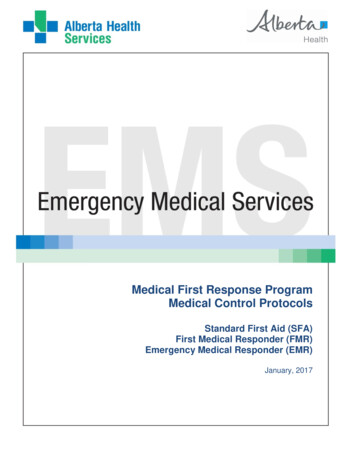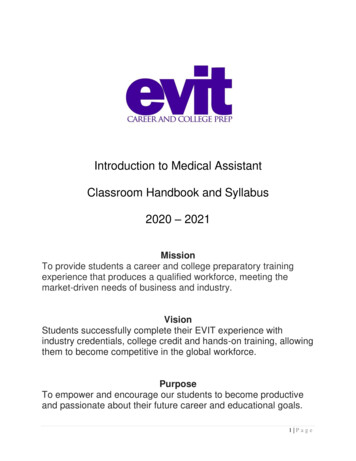
Transcription
Introduction to Medical AssistantClassroom Handbook and Syllabus2020 – 2021MissionTo provide students a career and college preparatory trainingexperience that produces a qualified workforce, meeting themarket-driven needs of business and industry.VisionStudents successfully complete their EVIT experience withindustry credentials, college credit and hands-on training, allowingthem to become competitive in the global workforce.PurposeTo empower and encourage our students to become productiveand passionate about their future career and educational goals.1 Page
Program Information/SyllabusCIP Code: 51.3900.00ADE Program Title: Medical Assistant ServicesEVIT Course Title: Introduction to Medical AssistantCredits: 0.5 Lab Science Credit &1 Elective Credit per semester (if approved)Instructors:NamePhone #PARENTSPLEASEREADEmailNamePhone #EmailMany students take this course before they enroll in another health program. Yoursuccess in INTRO TO MA is an indicator of how you will perform in the second year MAcourse. Your teacher will evaluate your professionalism, attendance and academicprogress throughout the year and make recommendations to the second year NAteachers on your placement and ability to be successful in the second year. Belowstandard performance in any area may result in your not being able to move to thesecond year.Course Overview:This course is designed to cover the following major topics associated with Medical AssistingServices:Legal and Ethical Issues, 11 Body systems, Emergency Care, Vital Signs, Nutrition, Infectioncontrol/safety, Job Development, Medical Terminology (students will learn 350 medicalprefix/suffix/root words)Units of InstructionLegal and Ethical Issues (20 hours)Safety Compliance In The Laboratory (13 hours)The Human Body Systems/ Medical terminology (363 hours)Emergency Care/Vital Signs (24 hours)Basic Principles of Human Nutrition (20 hours)Employability Skills (10 hours)Total Clock Hours: 450 hoursStudent Textbook(s) – textbooks are to remain in the classroom The Human Body in Health and Disease, Memmler 13th Edition, Lippincott Williams, andWilkinsInstructional Procedures Lecture Cooperative Learning Critical Thinking Projects Laboratory Based Experience2 Page
Arizona CTE Medical Assisting Services Standards:3.0 UTILIZE MEDICAL TERMINOLOGY8.0 ASSIST PROVIDER WITH PATIENT PROCEDURES10.0 APPLY STANDARD PRECAUTIONS AND SAFETY MEASURES11.0 APPLY LEGAL AND ETHICAL PRACTICES13.0 REVIEW BODY SYSTEMSArizona Professional Skills Standards:1.0 COMPLEX COMMUNICATION4.0 PROFESSIONALISM5.0 INITIATIVE AND SELF-DIRECTIONPARENTSPLEASEREAD You are expected to strive for attainment of all competencies.An average score of 75% or better on all unit exams for the year is the bench mark thatstudents are to achieve in order to show that they have attained the competencies.Any student who has an exam average of less than 75% at the end of the semesterwill be placed on a contract. If that exam average is less than 75% at the end of theyear, this will prohibit the student from moving into the second year MA course.Academic Skills Attained: Language: Medical terminology is learned which helps to improve general Englishlanguage skills. Reading: Frequent reading assignments target improved reading comprehension. Math: You will read, record and interpret graphs and charts. Basic math skills inaddition, subtraction, multiplication, division, metric system, Roman numerals, etc. areutilized in real-life health situations. Writing: You will be expected to write reports including research reports. Communication skills: You will gain skills and practice oral, non-verbal, and writtencommunication skills. Employability skills: You will create a job portfolio including a resume and cover letter,complete a job application form, practice interviewing skills, and learn how to dress forsuccess. Computer skills: You will use the Internet, create PowerPoint presentations, and wordprocessed documents.Class Response System (CPS) Students will use the CPS or “clickers” during various activities in the classroom Each student will receive a number clicker to be returned after use in class If a clicker is lost, damaged, or stolen, it will be the responsibility of the student to pay fora new one. If there is a problem with a clicker, it is the responsibility of the student to notifythe teacher right away.Evaluation/Grading Policies: Evaluation/Grading Policies Students receive 1.5 credits every 18 weeks. Grades are based upon a combination ofwritten exams, quizzes, written assignments, and hands-on skill testing. The following grade point system is utilized:A90 – 100%B80 – 89%C70 – 79%D60– 69%Fbelow 60%3 Page
PARENTSPLEASEREADIf a student has a 2.0 GPA or lower at the end of the first semester, a student willbe put on an improvement contract for second semester. A student must have aGPA of 2.0 or higher by the end of the 2nd semester in order to move into thesecond year MA course. (This is a C average or higher for all four quarters.)Testing Quizzes and written tests are given throughout the week to assess knowledge. Final exams – a final is given at the end of the first semester (covering only theinformation from the first semester), and another final exam given at the end of thesecond semester (covering only the information from the second semester). A medical terminology midterm and final exam will also be given.Academic Misconduct/Cheating:Cheating on an examination, laboratory work, written work (plagiarism); falsifying, forging oraltering school records. Cheating may result in dismissal from the program. Cheating, includes,but is not limited to: Copying from others during an examination. Any talking at all and/or communicating exam answers with another student during anexamination. Offering another person’s work as one’s own (plagiarism). Taking an examination foranother student or having someone take an examination for you. Sharing answers for a take-home examination or assignment unless specificallyauthorized by the instructor. Using unauthorized materials, prepared answers, written notes or information concealedin a book, cell phone or elsewhere during an examination. Acquires, without permission, tests or other academic material belonging to a member ofthe school faculty or staff. Removing tests from the classroom, duplicates, writes down, or copies questions oranswers on another piece of paper during test review sessions. Any student who knowingly or intentionally helps another student perform any of theabove acts of cheating or plagiarism is subject to discipline for academic dishonesty. Any preparation of written material that is fraudulent and/or untruthful.Assignments (Policy) Make-up: Students missing class are responsible for getting any assignments missed. Homework: Homework will very rarely be assigned; however, any work not completedin class will become homework. Late Work: Late work will be accepted with a 50% deduction from the final gradeearned. (In other words the best you can get on a late assignment is 50%). After thetest has been given for a unit, work that is late for that unit will not be accepted (inother words students have until the day of the unit test to turn in any late work forthat unit).Classroom Procedures:EVIT student handbook.Students are expected to follow the rules of behavior outlined in theClassroom Climate Act professional at all times. Mature behavior is expected of all students. Be in class on time every day and be productive.4 Page
Learning Preparation You should enter the classroom prepared to learn every day. This means get enoughrest and nourishment to function at peak capacity every day. You will be assigned a seat in class and the seating arrangement can change at thediscretion of the instructor. Leave your desk and surrounding area clean for the next student who will sit there. You must have with you every day:1.2.3.4.5.3 ring binder with dividersPen and pencilLined paperNote / Index cards (for medical terminology)Colored pencilsFood and Beverages Food and beverages other than water are not allowed in any building on thiscampus. Water must be in a clear water bottle with a lid.Items NOT ALLOWED in class Cell phones Smart Watches/Ear Pods/Ear Buds/IPods Laser pointers Magazines not approved by the instructors Skateboards Roller blades Weapons of any kindConsequences for use of unauthorized items Unauthorized items discovered in the classroom will be confiscated by your instructorand you may also be subject to disciplinary action.Unacceptable Clothing – students are expected to follow the EVIT dress code outlined inthe EVIT student handbook. In addition: All health students are required to wear scrubs and proper shoes designated for theirprogram. Proper shoes are tennis shoes with a closed toe (Sandals and slippers willnot be tolerated). Failure to adhere to this guideline may result in removal from theprogram. Pants/shorts are NOT to be worn under scrub bottoms. A plain white T shirt maybe worn under scrub tops. Jackets shall not be permitted over scrub tops.Classroom Maintenance You are expected to leave your desk and work area clean. Replace all textbooks, workbooks, folders and equipment to the proper storage area. Trash and recyclable items will be placed in the appropriate receptacle provided.Computer Use – Students are expected to adhere to the policy & guidelines on Use ofTechnology Resources in the EVIT Student Handbook. In addition: Use of the computers is a privilege and granted to students as long as he/sheunderstands and complies with the rules of use. Altering a computer’s standardconfiguration or operation is prohibited.5 Page
Students are required to use the Internet for research projects, and homeworkassignments. Access to Internet is available on chrome-books or in our computer labs.Course Fees: All fees are due by August 27th.ECC- 5.00Lab Supplies- 45PARENTSActivityfee 1.00Workbooks- 50PLEASEREADHOSA fee - 20Total 120.00 PARENTSPLEASEREADScrubs: Uniforms will be required on a date to be determined.Scrubs2 sets 40 (must be bought at EVITstore)CTSO PARENTSPLEASEREADCareer-Technical Student OrganizationHOSA Future Health Professionals is a student non-profit organization that teachesleadership and career development skills.HOSA competitions are available regionally, state wide, and nationally for possiblestudent participation.Students are required to participate in the annual HOSA service project, otherparticipation is voluntary.Standard of Conduct – students are expected to follow the Guidelines for Student Behaviorin the EVIT Student Handbook. In addition: Proper behavior is a job skill practiced by all industries. EVIT is not an exception. Health care students/workers are expected to have excellent work ethics, be able towork as a team player, and demonstrate an empathetic attitude for their clients. Respect one another’s right to be recognized. To speak during classroom time, alwaysraise your hand and wait to be acknowledged by the instructor. Otherwise pleaseremain silent during announcements, presentations, lectures, or demonstrations. Respect each other. Refer to others by their proper name. Respect EVIT staff. Refer to staff members as Mr., Mrs., or Ms., whichever isappropriate. Respect the property of others, your teacher, and the school. Students are required to stay on task, be organized, and practice time managementduring class time. All safety rules must be adhered to when working in the lab. Student’s heads must be in an upright position at all times. If your head is down, itappears that you are sleeping and not interested in class. No horseplay will be tolerated at any time. We will conduct school in a safe environment. Students may not leave the building during class time. Students may not leave theclassroom without a written permission in the form of a pass from the teacher. Students are responsible for the care of equipment (including desks) used andtextbooks. Violence has no place at EVIT. Violent behavior will result in immediate removal fromthe program.Failure to show professionalism by continually breaking these standards of conductwill result in a contract and with continual professional issues, student being deniedplacement in the second year MA course.6 Page
Consequences for Infractions First-time: Verbal warning from the instructor and you will be asked to stop or change thebehavior. Second-time: A phone call will be made to your parent or guardian for corrective action. Third-time: You will be referred to an administrator for corrective action. A phone callhome will also be made.PARENTSPLEASEREADZero Tolerance Policy:The East Valley Institute of Technology supports a Zero Tolerance Policy for the followingbehaviors: Intentionally or recklessly causing physical harm to any person on the campus or at aclinical site, or intentionally or recklessly causing reasonable apprehension of suchharm. Unauthorized use or possession of any weapon or explosive device on the campusor at a clinical site. Unauthorized use, distribution, or possession for purposes of distribution of anycontrolled substance (including vaping) or illegal drug on the campus or at a clinicalsite. EVIT has a zero tolerance for bullying including cyber bullying (i.e. Facebook,Twitter, Snapchat, or Instagram).A student engaging in this misconduct is subject to immediate dismissalfrom classes and disciplinary action as described in the EVIT StudentHandbook.Disciplinary Action Guidelines:When a student is in violation of any requirement contained in this Student Handbook,he/she is subject to disciplinary action or immediate dismissal. All students shouldcarefully review the EVIT Student Handbook. Dismissals and suspensions for reasonsbased on academic misconduct and student discipline, as well as reasons based on theStudent Handbook, will proceed according to the Judicial Policies section of the StudentDiscipline Code. See the Student Due Process section in the EVIT Student Handbook.Attendance:We have the highest standards for those going into a health care profession. Knowingthat showing up and being on time is of the utmost importance in health care, thefollowing additional items should be known:o Students who incur 5 unexcused or excused absences and/or 4 or morePARENTStardies per semester must attend make up sessions.PLEASEo Accumulation of more than seven (7) absences and/or 4 tardies during 1stREADsemester will result in a contract being issued at the beginning of the secondsemester. If that contract is broken in the second semester by showing thesame pattern of being absent and/or late, student will be denied moving intothe second year MA course.7 Page
Introduction to Medical Assistant Classroom Handbook and Syllabus 2020 – 2021 Mission To provide students a career and college preparatory training experience that produces a qualified workforce, meeting the market-driven needs of business and industry. Vision
